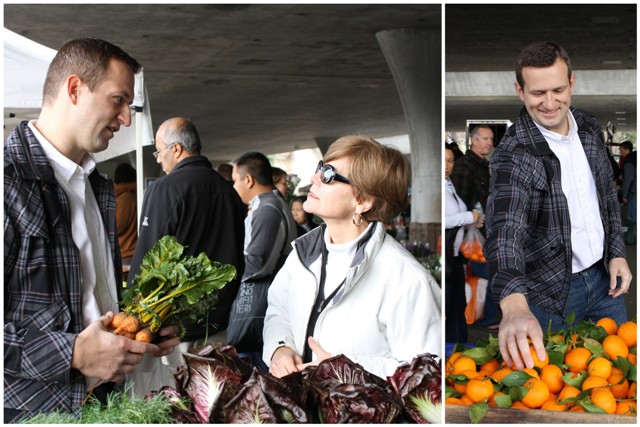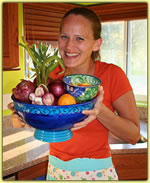When a highly personable, philanthropic, 32-year-old guy from the Midwest decides to run for City Council, and gets sworn in at the local farmers’ market after passing the California bar exam, I sit up and listen. This is no ordinary candidate.
I first heard Steve Hansen’s name when it appeared on the donation roster at a nonprofit where I worked. I later met him at an entirely different nonprofit where I was volunteering this summer. He’s active there, too! It almost seems that wherever a good cause exists, you’ll find Steve.
The thing that impressed me most about Steve is how approachable he is. As a fellow Midwesterner, he carries a familiar friendly-neighbor attitude that I find endearing. There’s not an ounce of snobbery in this guy!
I met with Steve this morning at the downtown farmers’ market. If elected to District 4, the market falls inside his territory, along with the rest of the Grid. We sampled blood oranges, bought produce, and chatted about his ideas for the future of Sacramento’s food system.
Steve told me that if he’s elected, he wants to donate his entire salary ($60,000 per year) as seed funding for social entrepreneurial innovation, like tech, health, and food. He has visions of a permanent farmers’ market in a warehouse on the Grid, close to light rail.
I like Steve! In the Midwest, we would call him “a stand up guy.” I hope you’ll see why.
You recently passed the bar exam and were sworn in at farmers’ market on January 29. Why the farmers’ market?
It’s reflective of who I am as a person. When I grew up, my grandparents at my dad’s house had a Victory Garden, so I grew up with huge gardens. When I came here I didn’t have a place to grow anything. When I did get a place, I planted some tomatoes. That’s what we do when we’re from the Midwest—we plant tomatoes.
I feel like when you’re connected to the land around you, you have a better appreciation for what you eat, how you eat, and it’s healthier, better for the environment, and it’s a great third space to form community.
Sacramento is blessed to have wonderful produce and agriculture, and it’s one of those strengths that we haven’t played up enough.
When you go to Barcelona, Spain, the farmers’ markets are permanent, and they have these beautiful structures. They’re happening year round. I think we need showcases like this, whether it’s under the freeway or Caesar Chavez Park or on Capitol Mall, or just a farm stand like Alchemists are doing. I think it’s a wonderful way to celebrate ourselves.
Where are you from in the Midwest?
Minnesota, don’t you know? (He says this laughing, using a Scandinavian accent.)
Were you successful with your tomatoes?
I was, but since then I haven’t cultivated as much. I actually bought a bunch of ground cover here. I have a side yard where I want to do something eventually, so I planted a bunch of plants I got here from Tadlock Landscapes. I bought like 40 or 50 ground cover plants that will be drought tolerant.
In 2010, UC Davis put out a study stating that Sacramento leads the nation in farmers’ markets. If elected, how do you envision tapping that growth and making it special and unique?
Food connects all people, because we all need it. In Sacramento, we have 3 or 4 different things happening all at once that make food a great way to build community. The growth of farmers’ markets is a way for people to come out and buy produce, fresh fruits, vegetables, locally raised meats, and I see that as being a complimentary strategy to community gardens, urban farms, things like the co-op. I want to see these different strategies used so we can be more sustainable, more self-reliant, and to build community.
For me, if I can further those policies to make it easier to have a farmers’ market, to make it easier for somebody to turn a neglected piece of land into an urban farm or a community garden. Those are the things where I think we can make a difference. Most of our community gardens have long waiting lists, and the demand is really pent up.
I think as a city our values are reflected by things like this, and as a strength it’s been under developed. As an economic issue, I think that agriculture, and especially high quality produce, can be an economic catalyst if we do it right as a way to develop our identity.
I can’t help but look at an empty lot and think, “What could that be?” Whether it’s an in-fill project where we could put another house to make sure people can live and work and enjoy a place without having to get into a car. I also look around and see large parcels where we could have urban farms, even on the grid; there are these great pieces of property that I don’t understand why they aren’t being used. They’re fenced off and essentially left behind, failed promises in a way and I’d like to see us focus on this more.
When you were part of the Downtown Partnership, you were instrumental in forming a foundation that would help homelessness in the region. I notice you live in Alkali Flats, so that’s probably an issue that you’re pretty aware of. What about some of the food access issues that we’re facing in Sacramento?
Making sure that we eliminate our food desserts should be a high priority to make sure that people have access to good quality food at a reasonable price.
The Downtown Sacramento Foundation was meant to be not just for work on homelessness, but to catalyze opportunities throughout the grid, throughout the central city. We could use that to raise money for things like urban farms; we could use that as a vehicle to inspire people to reclaim lots that have been neglected. There’s a world of opportunity.
Homelessness is certainly a complicated problem and there’s no easy fix. But I think that if we get together as a community and we begin to find the things that do make a difference, like the Navigator program that the Downtown Partnership runs, or whether it’s making sure that we treat people with respect, and that a law-enforcement first strategy isn’t the only strategy, then I think we’ll be moving in the right direction.
How long have you lived in Sacramento, and why did you decide to run for City Council?
I’ve been here for a decade. I thought I’d be here for a year, and then move to DC or somewhere else, but Sacramento is a wonderful city and I fell in love with it. I decided I want to fight for it. I really care about this city, and I want to live in a city where I can look around and see people who also care, and that’s what Sacramento is.
I decided to run because I thought that the people who care about this city didn’t always have a seat at the table, and I wanted to make sure that I help bring them to the table. I want to help empower people that don’t otherwise have opportunities.
When we work together as a community, stay united, we’re so powerful. The city of Sacramento sometimes is lost in the conversation about our state government. When you leave the city, people don’t understand what a great place to live this is. I want to tell that story, why we’re proud of ourselves, why we love ourselves as a city, and move beyond this gold rush history and the State Capitol, which is what most people know about Sacramento.
When people come here from LA or San Diego, they’re like, “Woah, I didn’t know you had all this stuff. This is cool!” Like farmers’ markets and arts and culture. They have this wrong perception of who we are, and to tell this story is part of what I want to do.




 Follow
Follow



{ 2 comments… read them below or add one }
Thanks for posting this article, Amber. As someone who lives (and votes) in the Grid, I found this info on Steve Hansen very interesting & informative.
Thanks, Ally! I’m glad it was helpful.
{ 1 trackback }